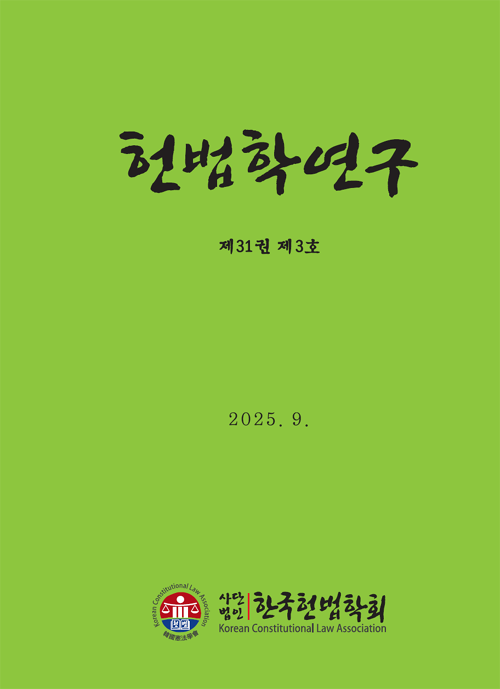- 영문명
- The Digital Public Sphere in Crisis: A Review of Free Speech in the Age of Algorithms
- 발행기관
- 한국헌법학회
- 저자명
- 문의빈(Euibien Moon)
- 간행물 정보
- 『헌법학연구』第31卷 第3號, 355~391쪽, 전체 37쪽
- 주제분류
- 법학 > 법학
- 파일형태
- 발행일자
- 2025.09.30
7,240원
구매일시로부터 72시간 이내에 다운로드 가능합니다.
이 학술논문 정보는 (주)교보문고와 각 발행기관 사이에 저작물 이용 계약이 체결된 것으로, 교보문고를 통해 제공되고 있습니다.

국문 초록
현대 민주주의 사회에서 공론장은 시민들이 자유롭게 의견을 교환하고 합리적 숙의를 통해 공동체적 의사를 형성하는 핵심적 공간으로 기능해왔다. 그러나 디지털 공론장이라고 할 수 있는 플랫폼은 개인의 행태정보를 분석하여 맞춤형 콘텐츠를 지속적으로 추천함으로써 필터 버블(filter bubble)과 에코 챔버(echo chamber)를 야기한다. 이러한 현상은 정치적 양극화를 심화시키고 사회적 갈등을 격화시켜, 민주주의의 기반을 위협하고 있다.
본 연구는 디지털 공론장의 위기에 대응하기 위한 표현의 자유를 재검토하기 위하여 우선 플랫폼 알고리즘이 정치적 양극화를 심화시키는 구체적 메커니즘을 분석하고 공론장의 위기 현상을 진단한다. 이어서 알고리즘 기반 추천이 헌법상 보호되는 표현의 자유에 포함되는지 여부를 검토한다. 이를 위하여 플랫폼의 콘텐츠 모더레이션에 대한 최근 미국 연방대법원의 판결인 Moody v. NetChoice 사건을 분석한다.
본 연구는 디지털 공론장의 기능 회복을 위하여 세 가지 관점에서 표현의 자유에 대한 재검토가 필요하다고 주장한다. 첫째, 전통적인 ‘국가 대 개인’이라는 이분법적 사고에서 벗어나 플랫폼이라는 새로운 행위자를 포함하는 다자주의적 관점이 필요하다. 플랫폼은 단순히 사적 기업을 넘어 공적 담론을 형성하는 핵심적인 역할을 수행하므로, 공적 기능에 대한 적절한 규율이 필수적이기 때문이다. 둘째, 플랫폼의 표현의 자유 제한 방식을 기존의 ‘삭제/유지’라는 이분법적 틀에서 벗어나 단계적이고 점진적인 접근으로 전환해야 한다. 콘텐츠의 유해성 정도에 따라 추천 약화, 하향 조정, 수익화 금지, 공유 금지, 섀도우밴, 삭제 등 다양한 스펙트럼에 따라 정교하게 제한함으로써 표현의 자유에 대한 과도한 침해를 막고, 동시에 공론장의 건전성을 회복할 수 있다. 마지막으로, 정보 과잉 시대에는 ‘화자 중심’의 표현의 자유를 넘어 ‘청자 중심’의 표현의 자유로 무게 중심을 이동할 필요가 있다. 이는 청자가 수동적으로 정보를 수용하는 것을 넘어, 비판적 미디어 리터러시 역량을 함양하여 스스로 필터 버블과 에코 챔버로부터 벗어날 수 있는 역량을 갖추도록 하는 것을 의미한다. 이러한 표현의 자유에 대한 재검토를 통해 플랫폼 알고리즘이 초래하는 공론장의 위기를 극복하고 민주주의 사회에서 필수적인 공론장의 기능 회복이 가능할 수 있음을 역설한다.
영문 초록
In modern democratic societies, the public sphere has been a crucial arena for citizens to freely exchange ideas and forge collective decisions through rational deliberation. However, digital platforms-what we might call “digital public sphere”- that analyse individual behavioural data to recommend personalised content have led to filter bubbles and echo chambers. This phenomenon has exacerbated political polarisation and intensified social conflicts, thereby posing a significant threat to the foundations of democracy.
In order to reconsider freedom of speech in light of the crisis in digital public sphere, this study first analyses the specific mechanisms through which platform algorithms deepen political polarisation and diagnoses the current crisis of public sphere. It then examines whether algorithmic recommendations should be protected under the constitutional right to freedom of speech. To this end, the study analyses the recent U.S. Supreme Court decision in Moody v. NetChoice, a case concerning content moderation on platforms.
A reconsideration of freedom of expression is necessary from three perspectives to restore the function of the digital public sphere. First, a pluralist perspective is required that moves beyond the traditional dichotomy of “State/Individual” to include a new actor: platforms. This is because platforms are more than just private companies; they play a crucial role in shaping public discourse, and therefore, proper regulation of their public function is essential. Second, the method by which platforms restrict freedom of speech should evolve beyond the traditional “Remove/Retain” dichotomy and adopt a phased, incremental approach. A spectrum of finely-tuned restrictions, such as weakened recommendations, demotions, demonetisation, sharing bans, shadow bans, and outright removals, could be applied based on the level of harmfulness of the content. This approach would help prevent excessive infringements on freedom of speech while restoring the health of the public discourse. Finally, in an age of information overload, it is essential to shift the focus from speaker-oriented freedom of speech to listener-oriented approach. This shift involves moving beyond the passive reception of information and empowering audiences with critical media literacy skills to help them break free from filter bubbles and echo chambers. This revised understanding of freedom of speech suggests a potential path to overcome the crisis of public sphere caused by platform algorithms and restore the vital function of public discourse in a democratic society.
목차
Ⅰ. 서론
Ⅱ. 공론장의 위기와 플랫폼 알고리즘
Ⅲ. 표현의 자유와 플랫폼의 알고리즘 기반 추천
Ⅳ. 공론장 회복을 위한 표현의 자유 재검토
Ⅴ. 결론
참고문헌
키워드
해당간행물 수록 논문
- 헌법학연구 제31권 제3호 목차
- 민주공화적 권력구조로의 개헌방안 - 다단계 협치론을 중심으로
- 법제처 법령해석제도의 헌법상 의의와 한계
- 국민주권 의미에서 소버린 AI의 실현 방향
- 국회의원 선거구획정위원회에 관한 헌법적 연구
- 공직선거법상 비례대표 국회의원 후보자의 공개장소에서의 연설ㆍ대담 금지규정에 관한 헌법적 검토
- 국회의원의 세대 간 불균형에 관한 헌법적 고찰
- 디지털사회전환(DX)과 미래농업을 위한 헌법적 과제
- 국가인권위원회의 독립성 보장에 관한 헌법적 고찰
- 남성 병역의무 부담에 관한 헌법재판소의 평등심사 연구 - 갈등극복과 사회통합을 위한 합리적 이유논증의 필요성
- 연령차별의 합리성에 대한 재고 - 정년제도를 중심으로
- 알고리즘 시대 공론장의 위기와 표현의 자유
- SNS상의 표현의 자유의 한계 - 미국 수정헌법 제1조의 해석과 미국 연방대법원의 진정한 위협(true threats)의 적용 범위를 중심으로
- 「교원의 학생생활지도에 관한 고시」에 관한 헌법적 검토
- 아동학대 예방 및 처벌 규정의 헌법적 소고 - 아동복지법과 아동학대특례법의 주요 헌법적 분쟁사례를 중심으로
- 신 일리학파(Neo-Elyian)의 비교정치과정 이론과 약한 사법심사
참고문헌
관련논문
법학 > 법학분야 BEST
- 인공지능 판사, 과연 가능한가?
- 정치의 사법화와 사법의 정치화 : 온건하고 실용적인 헌법재판의 당위성
- 자국 우선주의 정책과 국제법상 난민⋅이민자 보호-트럼프 행정부의 미국 우선주의를 중심으로-
최근 이용한 논문
교보eBook 첫 방문을 환영 합니다!

신규가입 혜택 지급이 완료 되었습니다.
바로 사용 가능한 교보e캐시 1,000원 (유효기간 7일)
지금 바로 교보eBook의 다양한 콘텐츠를 이용해 보세요!



